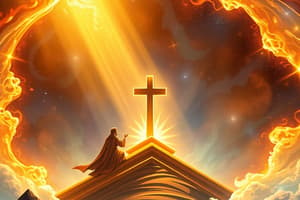Podcast
Questions and Answers
What does the First Commandment emphasize as a moral obligation?
What does the First Commandment emphasize as a moral obligation?
- To adore the one true God (correct)
- To accept all religious views equally
- To serve multiple gods
- To worship Mary and the saints
How can one express the meaning of the First Commandment in modern terms?
How can one express the meaning of the First Commandment in modern terms?
- Make God the center of your life (correct)
- Pray exclusively to the saints
- Live by your own moral code
- Explore various spiritual paths
Why is the First Commandment considered the most important?
Why is the First Commandment considered the most important?
- It is the basis for all other commandments (correct)
- It is the longest of all commandments
- It is the only commandment to mention love
- It specifies how to pray to the saints
What is a duty expressed by the First Commandment?
What is a duty expressed by the First Commandment?
What challenge do Filipino Catholics face regarding their prayer practices?
What challenge do Filipino Catholics face regarding their prayer practices?
What is the relationship between the First Commandment and the virtue of religion?
What is the relationship between the First Commandment and the virtue of religion?
What is a common misconception about the veneration of Mary and the saints?
What is a common misconception about the veneration of Mary and the saints?
What is the primary privilege of worship according to the First Commandment?
What is the primary privilege of worship according to the First Commandment?
What is the main warning conveyed about the use of images in worship?
What is the main warning conveyed about the use of images in worship?
What does the First Commandment teach regarding the relationship between God and creations?
What does the First Commandment teach regarding the relationship between God and creations?
What misconception do some people have about the veneration of sacred images?
What misconception do some people have about the veneration of sacred images?
What should be avoided in the use of images for worship according to the content?
What should be avoided in the use of images for worship according to the content?
How does the document suggest a person should view images of God?
How does the document suggest a person should view images of God?
What does the First Commandment primarily forbid?
What does the First Commandment primarily forbid?
Which biblical story is referenced to illustrate idolatry?
Which biblical story is referenced to illustrate idolatry?
According to the content, what can be considered modern idols?
According to the content, what can be considered modern idols?
What does the phrase 'no man can serve two masters' imply?
What does the phrase 'no man can serve two masters' imply?
What is a consequence of practicing idolatry, according to the content?
What is a consequence of practicing idolatry, according to the content?
Who is described as the perfect image of God?
Who is described as the perfect image of God?
How did Christ communicate spiritual realities during His ministry?
How did Christ communicate spiritual realities during His ministry?
What role do images have in the context of worship?
What role do images have in the context of worship?
Flashcards are hidden until you start studying
Study Notes
First Commandment Overview
- The First Commandment establishes the fundamental duty to worship only the one true God.
- It is expressed as: “I am the Lord your God. You shall not have other gods besides me.”
- The obligation to not worship other gods arises from the recognition of God's unique reality.
Significance of the First Commandment
- It is considered the most important commandment, forming the foundation of all others.
- Emphasizes the importance of recognizing and accepting God's lordship for moral and spiritual life.
- Cultivates a relationship built on faith, hope, and love towards God.
Duty of Prayer and Worship
- Worship is defined as recognizing God's dominion with devotion and service.
- The First Commandment stresses the necessity of homaging God alone, reaffirmed by Christ’s teachings.
- Fosters elements of religious virtue: adoration, prayer, and sacrifices, highlighting the right to religious freedom.
Issues of Idolatry
- Forbids the worship of any created entity, emphasizing no substitution for God.
- Idolatry represented by the biblical Golden Calf exemplifies the danger of misplaced worship.
- Modern idols include wealth, power, and possessions, which can distract from genuine worship.
Temptations and Superstitions
- Idolatry encompasses modern-day obsessions with fame, fortune, and practices like astrology or sorcery.
- It warns against worshipping wealth, success, and human attractions, directing devotion solely to God.
Prohibition on Carved Images
- God retains the exclusive right to express divine imagery; man is created in God's image.
- Jesus is depicted as the perfect image of God, fulfilling the request to reveal the Father.
- While images can aid in worship, they risk becoming idols if misused or misunderstood.
Cultural Context
- In the Philippines, veneration of images of Christ, Mary, and saints is common, but can be misconstrued as idolatry.
- Proper understanding of these images is crucial—they should lead worshippers to God rather than becoming deified themselves.
- The Church maintains the importance of using images appropriately to support true Christian prayer.
Core Takeaways
- Worshiping God is the primary duty of believers; idolatry disrespects His infinite love.
- Physical representations of God can enhance worship but must not replace the divine reality.
- The essence of God surpasses human comprehension; nothing can fully encapsulate His divine nature.
Studying That Suits You
Use AI to generate personalized quizzes and flashcards to suit your learning preferences.




